Publications
Articles, publications, books, tools and multimedia features from the U.S. Institute of Peace provide the latest news, analysis, research findings, practitioner guides and reports, all related to the conflict zones and issues that are at the center of the Institute’s work to prevent and reduce violent conflict.
Question And Answer
Amid a Changing Global Order, NATO Looks East

USIP Prevention Newsletter - January 2011
The bimonthly Prevention Newsletter provides highlights of the Institute's conceptual and region specific work aimed at helping to prevent conflicts in Africa, the Middle East, South and Northeast Asia, and the special project on genocide prevention. It also provides Over the Horizon thinking on trends in different regions, as well as information about events, working groups and publications.
On the Issues: Lebanon
Mona Yacoubian, director of the Lebanon Working Group at the U.S. Institute of Peace and special adviser to the Institute’s Center for Conflict Analysis and Prevention, discusses recent developments in Lebanon, and their broader impact on the region as well as prospects for peace in the Middle East.
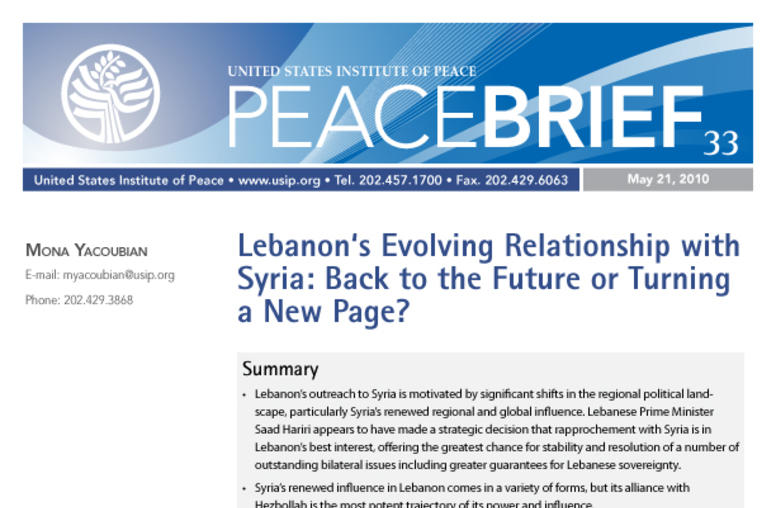
Lebanon‘s Evolving Relationship with Syria
Lebanon’s outreach to Syria is motivated by significant shifts in the regional political landscape, particularly Syria’s renewed regional and global influence. Lebanese Prime Minister Saad Hariri appears to have made a strategic decision that rapprochement with Syria is in Lebanon’s best interest, offering the greatest chance for stability and resolution of a number of outstanding bilateral issues including greater guarantees for Lebanese sovereignty.
In Pursuit of Democracy and Security in the Greater Middle East
This Working Paper is the culmination of the work of the Study Group on Reform and Security.
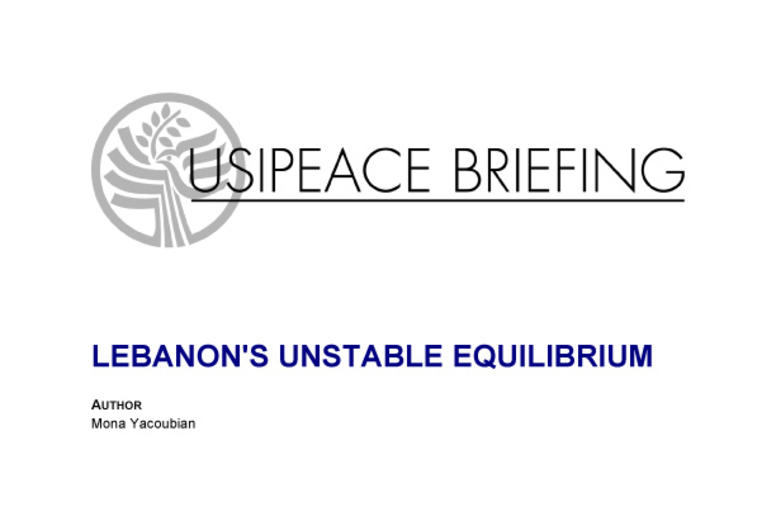
Lebanon's Unstable Equilibrium
Overview In the wake of Lebanon forming a new government, USIP assesses how the country can ensure ongoing political progress and stability. About the Author This USIPeace Briefing was written by Mona Yacoubian, a special adviser for the Muslim World Initiative at the Center for Conflict Analysis and Prevent at the United States Institute of Peace.
Lebanon's Parliamentary Elections
Lebanon's pro-Western bloc, known as the "March 14" coalition, will retain control of the country's government despite a strong challenge from a Hezbollah-dominated alliance, according to results from the June 7 parliamentary elections. USIP's Mona Yacoubian examines the electoral results, and what they suggest about support for Hezbollah, and the country's future direction.
Lebanon’s Parliamentary Elections:
The June 7th parliamentary elections mark another important step in Lebanon’s postcivil war transition. The Cedar Revolution opened a new chapter in Lebanese history, inaugurating the end of outright Syrian hegemony. The mass protest movement mobilized following the February 14, 2005, assassination of former Prime Minister Rafiq Hariri forced the Syrian military to withdraw in April 2005 after thirty years of occupation.
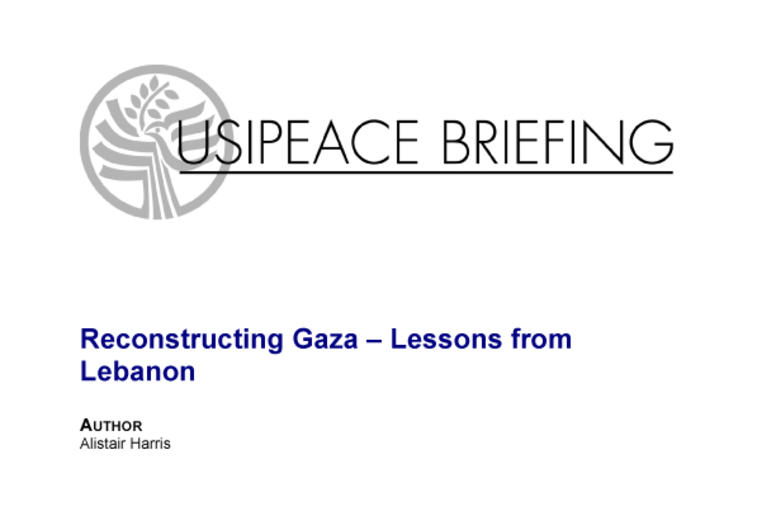
Reconstructing Gaza – Lessons from Lebanon
As the international community continues to debate humanitarian assistance to Gaza, USIP examines “Reconstructing Gaza – Lessons from Lebanon” by Beirut-based Alistair Harris, a Deployable Civilian Expert for the British Government’s Stabilisation Unit. Harris argues that donors should avoid the temptation to adopt a mechanistic, one size fits all solution. “In the rush to rebuild what was destroyed, it should be remembered,” writes Harris, “that the major catalysts for this conflict were pol...
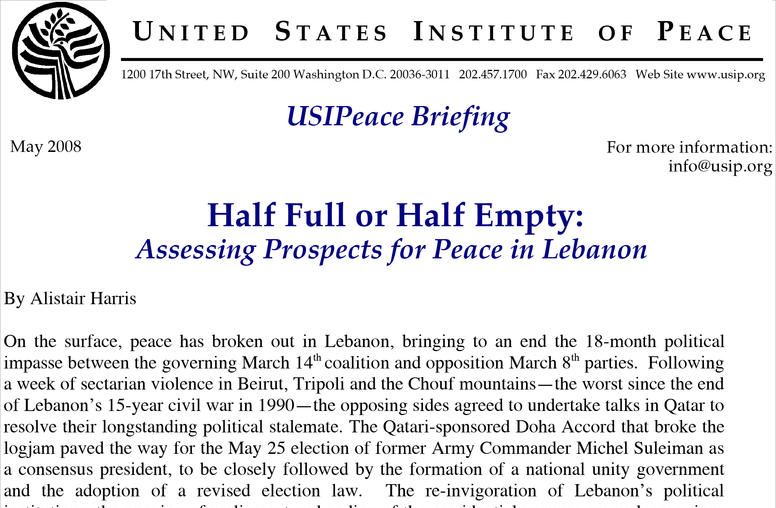
Half Full or Half Empty: Assessing Prospects for Peace in Lebanon
On the surface, peace has broken out in Lebanon, bringing to an end the 18-month political impasse. However, many questions remain. Alistair Harris, a Beirut-based expert on security and reform, explores these issues.
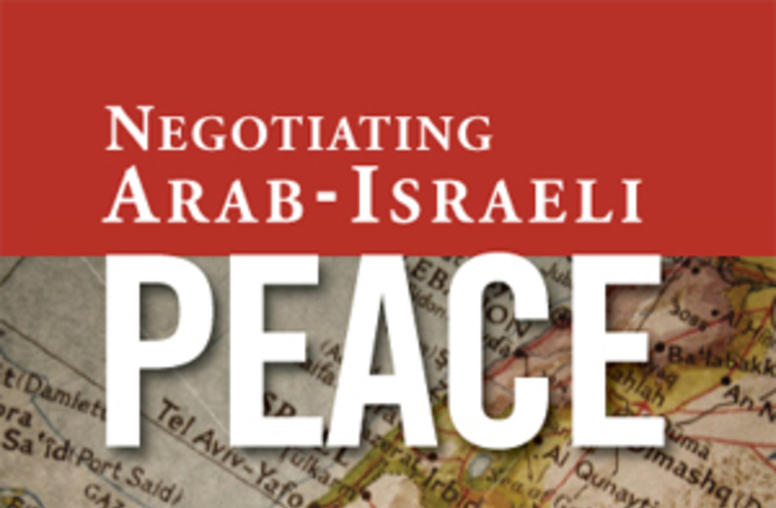
Negotiating Arab-Israeli Peace
As Washington struggles to revive the Arab-Israeli peace process, Kurtzer and Lasensky offer the definitive guidebook on how to broker peace in the Middle East.